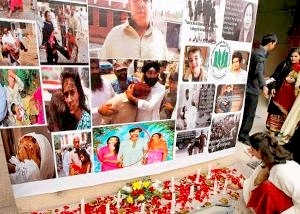Peshawar, Dec 26: Pakistani security forces have killed a Taliban commander who allegedly facilitated the Peshawar school massacre, which left 150 people dead in the country's worst ever terror attack, officials said on Friday.

Named only as "Saddam", the militant was killed Thursday night in a gunfight with security forces in the restive Khyber tribal area, which borders the northwestern city of Peshawar where last week's horrific attack took place.
"Commander Saddam was a dreaded terrorist, who was killed in an exchange of fire with the security forces in Jamrud town of Khyber tribal region," top local administration official Shahab Ali Shah told a press conference in Peshawar.
"Six of his accomplices were injured and arrested." He added that Saddam is believed to have facilitated the school attack, although the extent or capacity of his alleged involvement was not yet known.
"Authorities are currently interrogating the injured terrorists," Shah said.
He described Saddam as an important commander in the Pakistani Taliban, or Tehreek-e-Taliban Pakistan (TTP), and said he had masterminded several bomb attacks.
Saddam and his accomplices had been involved in several recent attacks on security forces that had resulted in heavy casualties, Shah said.
The Taliban and other militants have taken refuge in Khyber from a major army offensive launched in June in North Waziristan, another restive tribal area on the Afghan border that has been a hub for al-Qaida and Taliban militants since the early 2000s.
Meanwhile, a US drone strike on a Taliban compound in North Waziristan killed at least four militants on Friday, officials said, the second such incident in a week.
Another drone strike in North Waziristan on December 20 killed at least five militants, officials said.
The area is generally off-limits to journalists, making it difficult to independently verify the number and identity of the dead.
Washington pressed Islamabad for years to wipe out militant sanctuaries in North Waziristan, which have been used to launch attacks on Nato forces in Afghanistan.
Pakistan has ramped up its anti-terror strategy in the wake of the December 16 slaughter at an army-run school in Peshawar, where 134 children were among the victims gunned down by heavily-armed Taliban militants.
Prime Minister Nawaz Sharif has announced the establishment of military courts for terror-related cases in order to accelerate trials, and he has also lifted a six-year moratorium on the death penalty, reinstating it for terrorism-related cases.
Officials said Monday that Pakistan plans to execute around 500 militants in the coming weeks.





Comments
Add new comment